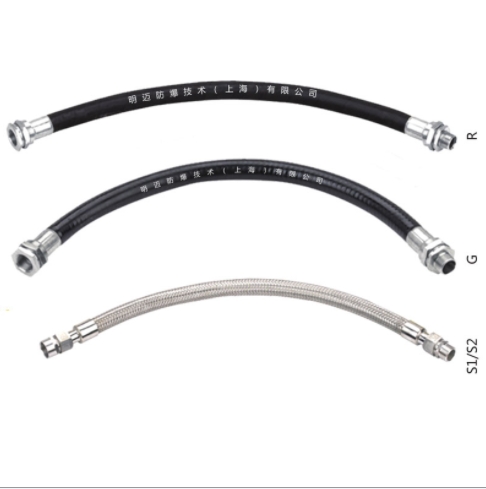Is Flexible Conduit Explosion-Proof?
In industrial environments where safety is paramount, the need for explosion-proof equipment is undeniable. The prevalence of explosive gases, dust and other hazardous substances in many industrial environments makes it imperative to use equipment that reduces the risk of sparking and burning. Conduit is an often overlooked critical component that plays a key role in protecting electrical wiring. This article explores the concept of explosion-proof hose and its importance in hazardous environments.

Understanding the Basics
Before delving into the details of explosion-proof flexible conduit, it's important to understand what conduit is and its role in industrial environments. Conduit is a protective sleeve or tube that is used to wrap wires and cables to protect them from external influences such as moisture, physical damage, and environmental conditions. It also helps to organise and protect electrical systems. In hazardous environments, conduit serves an even more important function - preventing the release of electrical sparks that could ignite explosive gases or dust.
Explosion protection requirements
Explosion-proof equipment is designed to protect the surrounding area by preventing and controlling explosions within the equipment itself. These devices must comply with strict safety standards and regulations. For electrical systems in hazardous environments, explosion-proof requirements require that the equipment be able to withstand and contain an internal explosion without igniting the surrounding atmosphere.
In order to meet these requirements, explosion-proof equipment is usually housed in robust, fireproof enclosures that can withstand the pressure and heat generated during an internal explosion. Such equipment also includes specialised seals and gaskets to prevent gases and dust from entering the equipment and to ensure that any internal explosion is contained within the enclosure.
Flexible Conduit in Hazardous Areas
Flexible conduit is used to route and protect wires and cables and is a common component in industrial electrical systems. In hazardous areas, such as those with explosive gases or dusts, the choice of conduit material and design is critical. Traditional rigid conduit materials such as steel or PVC may not be suitable for these environments because they cannot contain internal explosions.
This is where explosion-proof hose comes into play. Explosion-proof hose is specifically designed and manufactured to meet the stringent safety standards required in hazardous locations. Unlike rigid conduit, flexible conduit is made from materials that can withstand the pressure and heat generated during an internal explosion, ensuring that the blast is contained within the conduit.
Features of Explosion-Proof Flexible Conduit
Explosion-proof flexible conduit has a number of key features that make it suitable for use in hazardous areas:
Robust construction: Explosion-proof flexible conduits are typically made from materials such as stainless steel, galvanised steel or aluminium. These materials are able to withstand the pressures and temperatures associated with internal explosions.
Fire-resistant seals: To prevent the release of sparks or flames into the surrounding atmosphere, explosion-proof flexible conduits are equipped with fire-resistant seals and gaskets. These seals ensure that no gas or dust enters the conduit.
Restricted Explosion: The design of the explosion proof hose ensures that any internal explosion is confined within the conduit, preventing it from igniting the surrounding atmosphere.
Corrosion Resistant: In addition to their explosion-proof properties, many conduits have a corrosion-resistant design that allows them to last in challenging industrial environments.
Flexibility: As the name implies, flexible conduit can be bent to allow for easy wiring even around corners. This flexibility allows for multiple installations in complex industrial environments.
IP Rating: Some explosion-proof flexible conduits have an Ingress Protection (IP) rating, which indicates their ability to resist the ingress of foreign objects and moisture. This feature adds an extra layer of protection in challenging environments.
Multiple Sizes and Types: Explosion-proof flexible conduit is available in a variety of sizes and types, making it suitable for different applications and cable sizes.
Applications for Explosion-Proof Flexible Conduit
Explosion-proof flexible conduit is used in a variety of industries and applications where hazardous environments pose a significant risk. Some common uses include:
Chemical plants: Chemical plants often handle volatile substances. Explosion-proof flexible conduit is essential for protecting the electrical systems in these facilities.
Oil and Gas Industries: Explosive gases are prevalent in oil and gas extraction, refining and processing facilities. Explosion-proof conduit is widely used in these environments.
Mining: In underground mining operations, explosion-proof conduit is essential to minimise the risk of explosion in areas where combustible dusts and gases may be present.
Manufacturing: Many manufacturing processes generate potentially explosive dusts and gases. Explosion-proof flexible conduit helps maintain the safety of these facilities.
Wastewater Treatment Plants: Explosion-proof conduit is used to protect electrical systems in wastewater treatment facilities where flammable gases can accumulate.
Grain handling and storage: Dust generated during grain handling and storage is highly flammable. Explosion-proof conduits are essential to prevent fires and explosions.
Conclusion
In hazardous environments, safety cannot be compromised. The use of explosion-proof equipment is essential to minimise the risk of sparks, fires and explosions. In these challenging environments, explosion-proof flexible conduit plays a vital role in protecting electrical systems. Its robust construction, flame-retardant seals and ability to contain internal explosions make it an indispensable component in safety-critical industries. With strict standards and regulations, explosion-proof flexible conduit gives you the peace of mind you need to safely operate electrical systems in hazardous locations.
In short, the importance of explosion-proof hoses cannot be overstated when it comes to protecting electrical systems in hazardous environments. Their design and construction is tailored to meet the stringent requirements of explosion-proof equipment, ensuring that electrical sparks and internal explosions are safely contained. Whether in chemical plants, oil and gas facilities, mining operations or other industries where explosive gases or dusts are present, explosion-proof hose is an essential component that helps create a safer working environment.

Comments
0